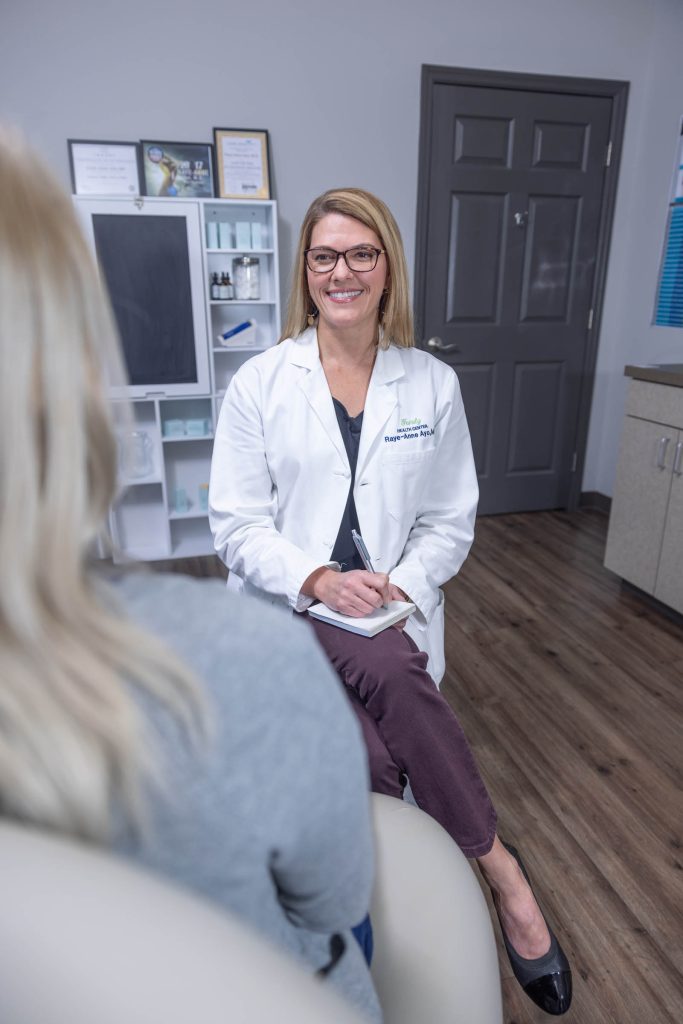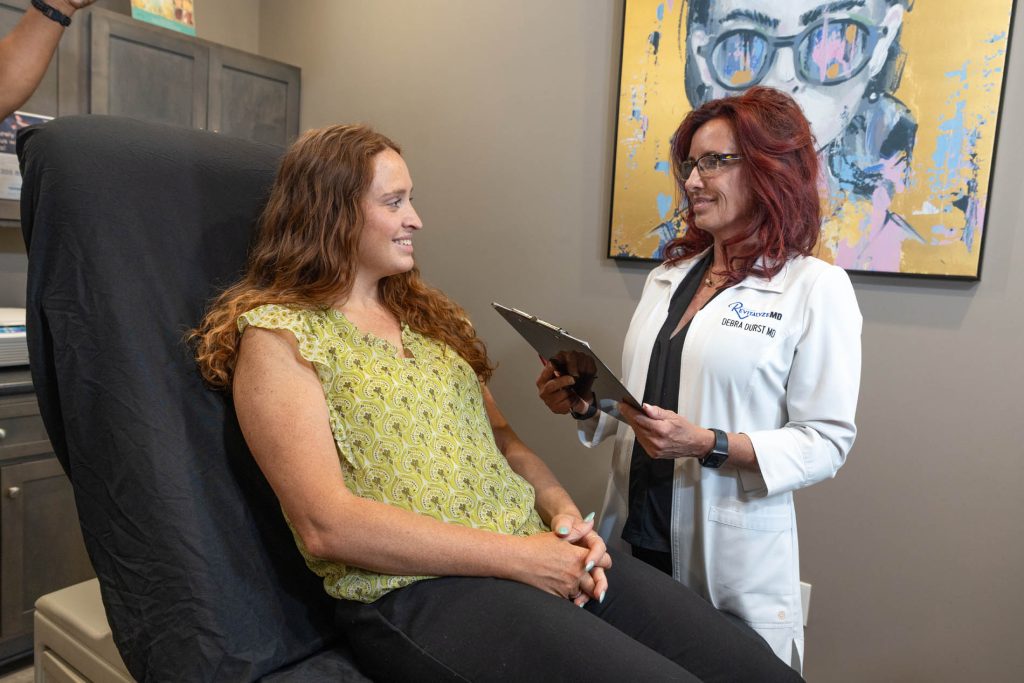Offered throughout East Tennessee, hormone replacement therapies may help the endocrine system cope as the body adjusts to age—a plausible stepping stone to aging with grace
We blame and credit hormones for major life changes—and for some questionable decisions—and usually regard them with hopelessness: it’s the hormones driving us! However, studies in endocrinology and Hormone Replacement Therapy (HRT) showed that we can control and adjust hormones to improve quality of life. And while HRT is not recommended lightly or widely used as an anti-aging tool, the practice has well-documented merits for both men and women.
As previously mentioned, there are many theories about aging, the neuroendocrine hypothesis being one of them. The hypothesis looks at the connection between the nervous system and endocrine glands, which produce hormones.

The hypothalamus in our brain controls the pituitary gland, which regulates other major glands like adrenal, thyroid, ovaries, and testes and their release of hormones. This system becomes less functional with age, which can negatively affect our metabolism, insulin processing power, blood pressure, and sleep quality.
To address some of these issues, hormone replacement therapy (HRT) started in the ‘60s and gained popularity in the ‘90s. Initial studies showed that the detriments outweighed the benefits; however, new studies showed that the use of HRT in younger women or in early postmenopausal women had a beneficial effect on the cardiovascular system, reducing coronary disease and all-cause mortality. Similarly, HRT showed positive results for men, especially in their later decades in life.
“The main goal I have for any patients is quality of life—and that applies to HRT too,” says Dr. Raye-Anne Ayo, MD, who offers concierge medicine services at her private practice, Family Health Center, PLLC in Farragut. “Age-related changes are normal—we can’t be 15-year-olds again no matter what we do. However, HRT has some clear benefits improving perimenopausal/menopausal and andropause symptoms, but it’s important to set specific goals and monitor the results closely.
“I work to find the right dosage and combination of hormones that are best for each individual—it’s not a one size fits all. I focus on FDA-approved HRT treatments, which are just a handful, then branch out as needed. I also point out that even if most HRT treatments are not covered by insurance, there are many affordable options.”
Dr. Debra Durst, MD and owner of RevitalyzeMD in Knoxville, says that she sees her patients gravitating toward “non-traditional solutions” such as HRT, but that hasn’t always been the case. The early studies scared patients—and many doctors—away from utilizing them, she says, and while newer studies come out about beneficial uses, the early studies continue to be a hurdle in the HRT industry. However, “It’s better than it was 10 years ago,” she says.
Aging and Our Hormones
The neuroendocrine system is complex and involves intricate connections between our nervous system and endocrine glands, which produce hormones. With age, the brain becomes less efficient at maintaining a fine balance of stimuli for glands, which can lead to high blood pressure, impaired sugar metabolism, and sleep abnormalities. We are probably aware of the normal drop in estrogen for women as they go through menopause and testosterone for men as they go through andropause. Beyond sex hormones, we need to be aware of other equally important types of hormones, such as metabolic (insulin and glucagon), stress (cortisol, adrenaline, noradrenaline), thyroid (triiodothyronine T3 and thyroxine T4), and growth hormones (insulin-like growth factor 1 IGF-1). Certain afflictions associated with aging should be on our priority watch list, such as diabetes, dementia, cardiovascular disease, bone density, and certain types of cancer.
Most HRT addresses symptoms of menopause in women and andropause in men. After menopause, women’s body stops making estrogen and progesterone, while for men, a drop in testosterone can be bothersome. Some of the symptoms for women include hot flashes, night sweats, sleep problems, vaginal dryness, anxiety, moodiness, brain fog, and low libido. “In that 40 to 55-60 timeframe, 50 percent of women will have some kind of sexual dysfunction and depression related to it,” Dr. Durst says. Men can experience low libido and depression, too, along with lack of energy and muscle loss. Many of these symptoms are par for the course; however, HRT can be an option when the symptoms are severe or significantly impact quality of life—aka when we’re simply miserable. Dr. Durst says comprehensive approaches to these significant changes is ideal.
Types of Hormones and HRT
So, let’s talk about types of hormones used in HRT. There are synthetic hormones (such as Premarin and Provera), animal-derived hormones (such as conjugated equine estrogens or CEE), and bioidentical hormones (such as estradiol, estriol and progesterone), which have the same molecular structure as the hormones made by your body. There has been debate regarding the efficiency and safety of synthetic vs bioidentical hormone use. According to the US Food and Drug Administration and as stated by Dr. Tatnai Burnett for Mayo Clinic, “there is little or no evidence to support claims that bioidentical hormones are safer or more effective.” However, some clinical outcomes showed lower risks associated with bioidentical hormones, including the risk of breast cancer and cardiovascular disease. So, while the jury is still out, most practitioners will opt for the “natural” bioidentical hormones.
Many specialists saw positive results with pellets. However, the administration mode will depend on your personal comfort. As Dr. Casey Page, a seasoned endocrinologist with Endocrinology Consultants of East Tennessee, points out, patients’ skin has different levels of absorption, so a topical application might not work best for some. Also, while taking a pill is easy and unintrusive, the content of the pill must be processed by our body through intestines and the liver before reaching our system, so there is a delay or potential loss of efficiency in the process. Some patients prefer a quick at-home injection, while others are irked by the thought of needles. The advantage of pellets is a slow and steady release of hormones, along with no impediment for absorption.
HRT for women uses estrogen, progestin (a type of progesterone), or both; sometimes testosterone is also added. For men, HRT focuses on testosterone. There are many ways to receive HRT, including nasal sprays, pills, topical gels, skin patches, injections, vaginal creams or suppositories, intrauterine devices, and subcutaneous pellets.
“It’s important to have the right combination and dosage of hormones. I tell my male patients that if they start crying at Hallmark movies, they need to come back in to see me,” shares Dr. Ayo. “While topicals are easy to apply and pellets metabolize easier since they don’t have to go through the digestive system first, if you don’t get the dosage right, you might have to live with unwanted side effects such as moodiness or irritability and more.”

The Good and the Bad
As with any medical intervention, possible benefits go hand in hand with possible risks. “There’s always going to be side effects of anything you do,” Dr. Durst says, “and as long as it’s managed closely and appropriately, you’ll minimize that. Risk also depends on the person.” Education, she says, is the key.
According to a study published in 2022 in The Cancer Journal, evidence from the study indicates that HRT effects depend on timing of initiation (as related to menopause) and duration of therapy. “HRT for women <60 years of age and/or at or near menopause significantly reduces all-cause mortality and cardiovascular disease (CVD), whereas other primary CVD prevention therapies fail to do so […],” it states in the study. “HRT-associated risks, including breast cancer, stroke and venous thromboembolism are rare (<10 events/10,000 women), not unique to HRT and comparable with other medications.”
Medical experts disagree about the significance of a testosterone level decrease, as it doesn’t affect one’s health any more so than the natural aging process does. Commonly used to treat men with symptomatic hypogonadism, HRT (specifically testosterone hormone therapy—TRT), benefits bone density, strength and muscle mass, heart health, as well as increased libido and energy level.
The results of one of the largest clinical trials of TRT in men with hypogonadism were published just this past June in the New England Journal of Medicine, showing that TRT did not cause any more major cardiac events than the placebo in the study. However, the study did show a “higher incidence of atrial fibrillation, acute kidney injury, and issues arising from blood clots in the veins” for those who received the testosterone, according to the study’s release. Benefits and risks.
Best to speak to a doctor for your own unique situation.
Hormones are Personal; HRT Should Be, Too.
Hormones are complicated, so having access to the right professional for consultation is crucial. “We are aware of both the positive implications and the potential risks of the different dosage and combinations of hormones, so we are always carefully testing for levels of specific hormones and discuss a patient’s health background before we recommend a hormone therapy,” shares Dr. Page. “In the end, this is a very personal decision and different patients have different levels of comfort with HRT.” Lab work and regular check-ins are important during the process to assess changes and drive adjustments in dosage and mix.
“For me, number one is treating the patient not the numbers, so whenever someone asks me if HRT is an option for them, I evaluate them holistically and work with them on a very personal level to outline the best course of action,” shares Dr. Ayo. “I usually don’t recommend HRT unless someone has severe symptoms. However, I work with my patients to consider when the benefits outweigh the risks, then have a trial period for HRT. We set specific goals and monitor for changes.”
In addition to being a qualified specialist, your HRT provider should be a good fit for you. “People are looking for solutions—non-traditional solutions—right now, and HRT is the basis because you can’t optimize your cell health and optimize health without it,” shares Dr. Durst. “The focus of our practice is optimizing hormones for prevention and better quality of life, but also to extend that. To have conversations about sex and how to get those changes back and to improve the changes that both men and women are noticing as they age.”
Bottom Line
HRT is not a panacea, and hormone modifications are normal as we age. Most doctors will recommend HRT only when symptoms of hormone loss are severely affecting one’s quality of life, some as a preventative action.
According to a 2021 article published by Mayo Clinic, “positive lifestyle modifications such as regular aerobic and resistance exercise programs and/or healthy calorically restricted diet can favorably affect endocrine and metabolic functions and act as countermeasures to various age-related diseases.”
A change in hormones as we age is normal and inevitable, while a change in our lifestyle is something we can control.

Comments are closed.